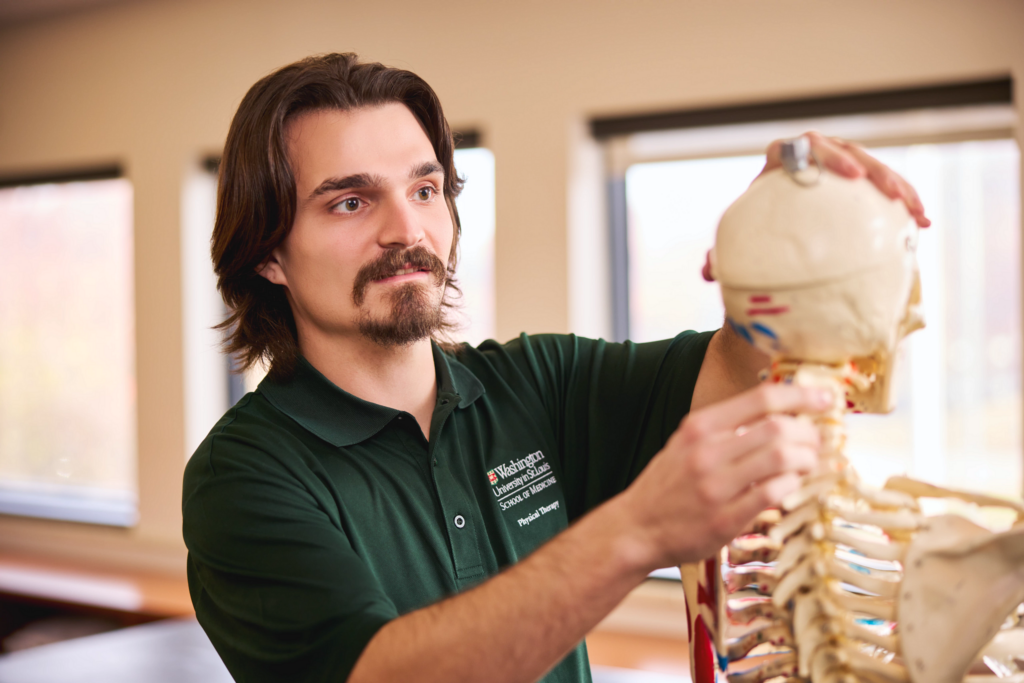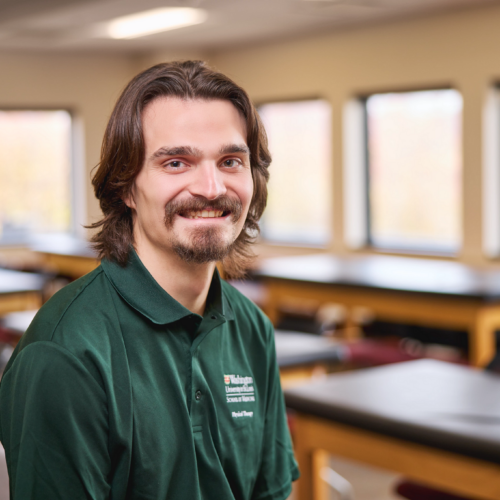By Matt Hampton
Leo Jacobs is on a mission to help patients as a physical therapist — a quest that materialized after his grandfather was diagnosed with leukemia.
The cancer impaired his mobility, strength, and balance. Leo was 15 and had a close relationship with his grandfather. Doctors said that exercise would help alleviate his symptoms, so Leo assisted him with walks, resistance band workouts, and other activities.
Growing up in rural Alabama, Leo played high-school football and worked full time, including in construction and agriculture.
“I was a bit heftier back then, and my granddad was a pretty big dude,” Leo says. “I was one of the only grandkids that he felt comfortable around because he would have falls and I would catch him.”
Leo’s experience helping his grandfather sparked a passion for the field of physical therapy. At 16, he began working as a physical therapy technician. He also found a side job helping a 10-year-old patient with a neurological disorder complete his exercise routine and daily tasks.
“I completely fell in love with working with kids, particularly kids with neurological disorders,” he says.
Leo’s path eventually brought him to Washington University, where he is a second-year Doctor of Physical Therapy student.
“My scholarships are really meaningful to me,” he says. “They are recognition for my hard work. All those years that I didn’t sleep and studied so hard — it’s like I’m getting paid for that now in a way.”
Leo Jacobs, DPT Class of 2025
The cost of education looms large in the minds of many physical therapy students, especially since student debt repayment may be onerous relative to their income early in their careers. This burden can hinder progress toward life milestones such as marriage, homeownership, and parenthood. As such, scholarships are a valuable benefit for students traversing this career path.
Leo is funding his education and living expenses through student loans and his work as a teaching assistant and tutor. In addition, he has received scholarships, including the Gina Prescott Earnest Scholarship, which have taken a weight off his shoulders.
“I’m getting a great education, but my degree program is intense,” he says. “My scholarships make me feel like, ‘Hey, you can relax and take a deep breath every now and then.’”
Leo has never been afraid to work hard to achieve his goals. Throughout his adolescent and undergraduate years, he sometimes clocked as many as 70 hours a week — on top of school — balancing jobs that ranged from hauling refrigerators to moving industrial pipes.
He earned his bachelor’s degree from the University of Alabama at Birmingham in three years to save money. While an undergraduate, he volunteered at the Children’s Hospital of Alabama and worked as an anatomy teaching assistant.
At WashU, Leo assumed the role of anatomy teaching assistant in the Program in Physical Therapy while enrolled in the course as a first-year student. Although this position typically is reserved for more experienced students, the course instructor orchestrated the unconventional opportunity for Leo, recognizing his acumen and fervor for the subject matter.

“My scholarships are really meaningful to me,” he says. “They are recognition for my hard work. All those years that I didn’t sleep and studied so hard — it’s like I’m getting paid for that now in a way.”
Although he is still working hard, scholarships allow him to focus on his passions instead of a paycheck. He volunteers many hours at nonprofits, including the June Jessee Memorial Foundation, through which he cares for a child with a cognitive impairment, and the Disabled Athlete Sports Association, where he teaches swim lessons to members of the community.
Leo’s gratitude for the financial support he has received motivates him to use his education to do the most he can to help others.
“Having received scholarships, I want to use my degree to do a high volume of good,” Leo says. “I hope to be able to pay it forward someday to students who come after me as well as my patients.”
Your gift to Make Way: Our Student Initiative will help attract the best and the brightest students and allow them to improve the well-being of patients in St. Louis and around the world.
